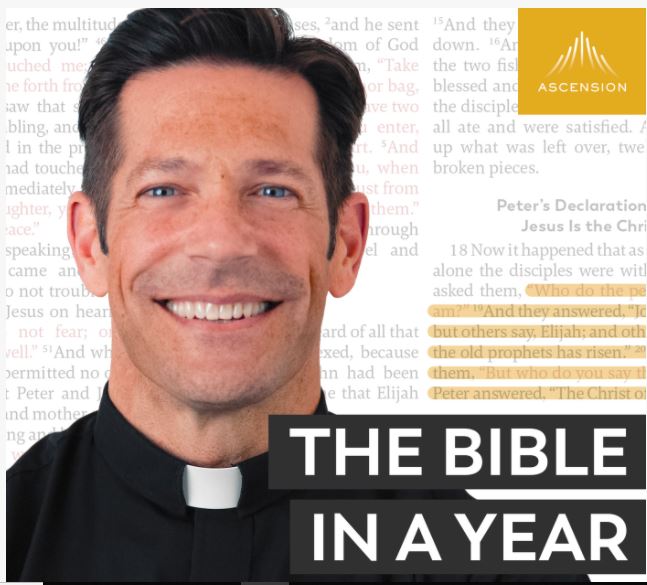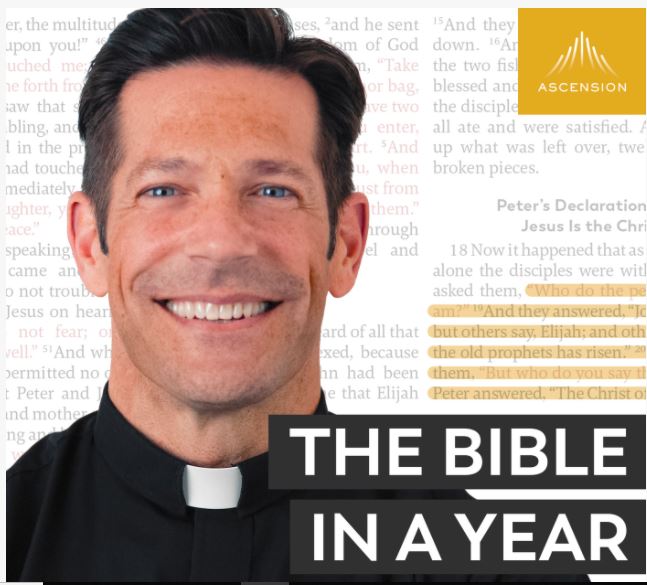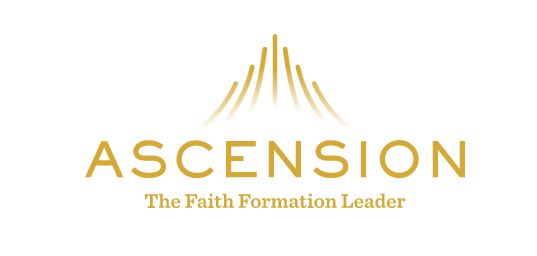“We Repeat What We Do Not Repair”
Father Peter Fitzgibbons
July 24 – 25, 2021
Gospel: John 6:1-15
It is said that lessons must be repeated until they are learned which means, for most of us, lessons need to be constantly repeated. Sometimes, you think you’ve learned a lesson, but you learned it incorrectly. Other times, we see things and know right away this means this and that means that. We’ve taken something away from the lesson that wasn’t really there. Oops! We need to be better students and learners. Do you know which virtue “learning” is connected to? Justice. I remember one man, a seminarian and now a priest, who asked me for advice. I told him to always take his books into the chapel before the Blessed Sacrament. If you are going to read about the Man, then be with the Man. Good idea…I have a few now and again.
In the story about God’s miracle involving the loaves and fishes, 5,000 men were there who could not find places to sit…that’s a lot of men. There were no women and children there…apparently, they had not been vaccinated. Now, this scripture was written in Hebrew, so 5,000 was a number beyond all counting… an infinite number. Philip told our Lord that “Two hundred days’ wages worth of food would not be enough for each of them to have a little bit.” So, was Philip like Stuart Varney, a market watcher? Did he watch the market and know the cost of food? No, Philip was using a hyperbole…a number beyond comprehension. After everyone had eaten, the apostles collected 12 baskets of leftover food. The number 12 is another mystical number in Hebrew representing the 12 nations of Israel. So, it was a huge number beyond counting, demonstrating the power of Christ and what He can do. And, what did they learn from the miracle? They learned the wrong thing. They thought He was the “bread king.” “Hey, He fed us, so He’s going to give us stuff we didn’t have to work for. Cool! We will make Him king, and we’ll get all the stuff we want.” This was another temptation of Christ. Remember, the first temptation? After spending 40 days of fasting in the desert, Satan said to Him, “If You are the Son of God, tell these stones to become bread.” After seeing the miracle with the loaves and fishes, did people want holiness and their souls filled? No, they wanted their stomachs filled. They wanted stuff. The temptation of Christ was to give people stuff even though He came for the salvation of souls. First things first.
People come every day and want stuff from the church. Their stories are really fun, but it’s not what we can give. In Acts, Peter said, “Silver and gold I have none; but what I have, I give you. Pick up your mat and walk.” At first, even the apostles didn’t get the lesson. He came down to redeem you. That was the lesson to take away. After all the miracles our good Lord did, how many were there with Him at the end? They did not learn the lesson until they were enlightened by grace. They had the knowledge, because they had heard Him. They weren’t idiots, but they didn’t know what the knowledge meant. This is when we have to go to prayer to listen and to be enlightened. You may have the knowledge, but that doesn’t guarantee you know what it means.
I was reading an article this morning about the old Latin Mass. “People did not participate in the Latin Mass.” Or, in the order of the Mass we do now, “People must participate. They have to run up and down the aisle. We have to do a better job.” I say, at best, that is blasphemy and at worst, it’s sacrilegious, because you know nothing about the Mass. If you took a picture at Calvary, how many people were running around? Do you think the Blessed Mother was crucifying Jesus? No. They stood there and shared in His suffering. They became part of His suffering through love. Whose human nature suffered on the cross? The Blessed Mother’s. Whose human nature suffered along with Him? That of Saint John the Apostle, Mary the wife of Clopas, and Mary Magdalene. This is what the faithful do, because in the Holy Sacrifice of the Mass, you give your human nature to me, as the priest functioning in the person of Christ, and you are just like Saint John, Mary, and Mary at the cross suffering with Christ. You cannot get more participation than that. The people who say these things never offered Mass, and they probably aren’t priests. If they are, they are stupid ones. When I offer Mass in nursing homes, I don’t get much singing and all that. Sometimes, the mentally challenged residents will yell out during Mass, “Father, I have an idea!” We’ll talk about it after Mass. Do they participate? Yes, as much as they can.
People have heard the lesson and they have the knowledge, but they have no idea what it means. In order to have knowledge, we have to be humble, and we have to become small. As Saint Therese of Lisieux said, “When I am small, I am safe.” We must surrender to judgement. Sometimes, we tell God, “I cannot do this…I don’t understand.” Well, I don’t understand a lot of things. Each day I’m mystified by something, and that’s okay. I don’t have to understand everything. I know a lot of bright people I can call up or text, not while I’m driving, and probably get some guidance. Why does God allow this? Why did God allow this to happen? It’s always good to ask, not for understanding, but for the strength to bear what we cannot endure. Sometimes, our lives and our crosses seem too much to bear. To learn the proper lessons our Lord is teaching us today is a precursor to the Eucharist. Lord, speak for your servant is listening.
How will you apply this message to your life? You may have the knowledge, but do you know what it means? Go to prayer to listen and to be enlightened.
You can read all of Father Fitzgibbons’ sermons by going to https://annunciationcatholicalbemarle.com/ and clicking on “Blog” then “Categories” and then “Sermon Notes.” From a cell phone, click on “Blog” then “Menu” and then “Categories” (located at the end of page). There is also a search box if you are looking for a specific topic.






